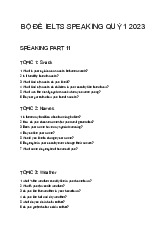






Preview text:
lOMoAR cPSD| 45349271 LISTENING JOURNAL Transcript 1:
Do you really need 8 hours of sleep every night? (https://www.ted.com/talks/
jen_gunter_do_you_real y_need_8_hours_of_sleep_every_night ) 00:00- 01:43
Sleep is so important. We need it to live. And when we can't sleep, we're desperate for help.
But lately, our fascination with sleep feels as if it's taken on an urgency. Do a
quick internet search for sleep and you'll find a slew of articles about how to make
your sleep perfect. New gadgets, fancy alarm clocks, stay away from blue light.
There are lots of services, products and advice columns that tell us we're sleeping
wrong. Not enough, not quality sleep, wrong position. Even worse, you might find
scary messaging claiming that if you're not sleeping right your life is going to be
shorter, you're going to get all kinds of diseases. One of the biggest worries we have
about our sleep is that we're not getting enough and that anything less than seven
hours a night means that we’re doomed to bad health, everything from high blood
pressure to Alzheimer’s disease. But there are two flaws with this kind of messaging.
The first flaw is that it's not completely accurate. Seven to eight hours of sleep, while
recommended for adults, is just an average. And while messages have to be
simplified for health communication to the public, sometimes important nuances
get lost. So yes, it's true that not getting enough sleep in the long term is associated
with health problems like cardiovascular disease, diabetes and depression. But
fixating solely on seven to eight hours ignores the fact that there's a range of sleep
that people need. The duration of a good night's sleep can be different for different
people. Some adults need eight, but some are just fine on six. Word Pronunciation Meaning Example Desperate(Adj)
UK: / des.pər.ət/ US: -Very serious -The situation is ˈ / des.p .ət/ˈ ɚ or bad. - desperate - we Needing or have no food, very wanting little water and no something medical supplies. - very much. He was desperate to tell someone his good news. lOMoAR cPSD| 45349271
UK:/ fæs.ən e . ən/ ˌ ˈ ɪ Fascination (N) The fact of -Miller's ʃ
US:/ fæs.ən e . ən/ˌ ˈ ɪ finding fascination with ʃ someone or medieval art dates something from her childhood. fascinating. Gadget(N) UK: /ˈɡæd . t/ʒ ɪ
A small device Have you seen this US: /ˈɡæd .ət/ʒ or machine handy little gadget with a - it's for separating particular egg yolks from purpose. whites. Simplify(V)
UK: / s m.pl .fa / US: ˈ To make He tried to ɪ ɪ ɪ / s
something less simplify the story m.plə.fa /ˈ ɪ ɪ complicated for the younger and therefore audience. easier to do or understand. Nuance(N) UK: / nju . ns/ ˈ ː ɑː -A very slight -The painter has US: / nu . ns/ˈ ː ɑː difference in managed to appearance, capture every meaning, nuance of the sound, etc. -a woman's quality of expression. - something Actors have to that is not study the nuances easy to notice of facial but may be expression to important. show the whole range of emotions.
Cardiovascular(Adj) UK: /k .di.əɑːʊ Relating to the He underwent ˈvæs.kjə.lər/ US: heart and cardiac /k r.di.oɑː ʊˈvæs.kjə.l blood vessels catheterization and / cardiovascular ɚ (= tubes that carry blood malformations around the could be excluded. body) Associated(Adj)
UK:/ə sə .si.e .t d/ ˈ ʊ ɪ Connected She was prepared
ɪ US:/ə so .si.e . d/ˈ ʊ ɪ to take on the job, t̬ɪ with all its associated risks. lOMoAR cPSD| 45349271 Duration(N)
UK : /dʒʊ ˈə re . ən/ The length of He planned a stay
USɪ ʃ : /du re . ən/ːˈ ɪ ʃ time that of two years' something duration. lasts. Transcript 2:
What happens in your brain when you exercise? Moving your body can
help you get out of depression
(https://www.voicetube.com/videos/83072)
Have you ever thought about what happens in your brain when you're moving around
working up a sweat? Most people know that exercise protects against diseases such as
cancer and diabetes. And if you've ever opened a celebrity magazine, you know that
exercise helps you with weight control and building stronger muscles. But what happens
inside your body is much more interesting: moving your body wil actually help you get out of
depression! When you exercise, chemicals that contribute to happiness and pleasure are
released in the brain. This means that someone who has just finished a power walk feels
happier immediately! This part of the brain is called the prefrontal cortex. It has many
important responsibilities, and you activate it when you exercise. The prefrontal cortex acts
as an emotional brake that helps you handle strong emotions, which can be important when
you're going through depression. It's also in charge of concentration. Perhaps you have
noticed that it's harder to concentrate? When you exercise, your prefrontal cortex gets
busier, and your ability to concentrate and react quickly wil improve immediately. A good
idea is to do some light jogging an hour before an exam or an important meeting. Now you
know a bit about what happens in your brain immediately after working up a sweat. But what
happens in the long run if you make exercise a regular thing? Moving your body a few times
a week means new brain cells are born inside your head, both in the prefrontal cortex and in
this other neat brain area called the Hippocampus. These areas of the brain get bigger.
The hippocampus is a part of your body that you real y want to keep as big as possible.
Among other things it's responsible for long-term memory. So, what happens inside your
body when you take a sweaty walk is much more important than what happens on the
outside! You wil become better at handling emotions, and be able to concentrate and
remember things. Perhaps most importantly, it wil affect your mood in a positive way. Word Pronunciation Meaning Example Sweat(N) UK: /swet/ US: The clear, salty liquid The dancers were B2 /swet/ that you pass through dripping with/pouring your skin. with sweat after a morning's rehearsal. lOMoAR cPSD| 45349271 Diabetes(N) US: /da ə bit s,-tiz/ɪ ˈ A disease in which the He had developed B2 ɪ UK: /da ə body cannot control the diabetes and high blood bi:ti:z/ɪ ˈ level of sugar in the pressure. blood. Muscle(N) UK: / m s.əl/ ˈ ʌ
-One of many tissues in -These exercises build US: / m s.əl/ˈ ʌ the body that can muscle and increase tighten and relax to stamina. produce movement. -Russel pul ed a back
-(C1) To injure a muscle muscle early in the
by stretching it too far so game. that it is very painful. Depression(N) B2 US: /d pr ən/ɪˈ ɛʃ -The onset of UK: /d 'pre n/ -Medical condition of a ɪ ʃ depression often lack of vitality. -Period follows a traumatic of unemployment and event. -Her depression low economic activity. has lifted now. Release(V) UK: /r li s/ ɪˈ ː
-To give freedom or free -He was released from US: /r li s/ɪˈ ː movement to someone prison after serving two or something. -(C1)To years of a five-year allow a substance to sentence. flow out from -Coal power stations somewhere . -(C1)To release sulphur dioxide express a feeling that into the atmosphere. - you have been trying He punched the pil ow in not to show. an effort to release his anger. Prefrontal cortex(N) UK: /pri .fr n.təlː The front part of the Exercise counters ʌ
brain, that is important in agerelated shrinking of ˈ ɔːk .teks/ human behaviour such the prefrontal cortex. US: /pri .fr n. əlː as planning, ʌ t̬ decisionmaking, and ˈ ɔːk r.teks/ self-control. Concentration(N) UK: /k n.sən tre . ən/ -The ability to think -It was hard to follow B2 ɒ ˈ ɪ ʃ US carefully about what the teacher was /k n.sən tre . ən/ɑː something you are saying, and eventually ˈ ɪ ʃ doing and nothing else. I lost concentration. - -(C2) A large number or (C2) High amount of something in concentrations of toxic the same place. elements were found in the pol uted areas. The Hippocampus US: /h p.ə kæm.pəs/ɪ
A part of the brain that is Neuronal death in the ˈ
part of the limbic system hippocampus is UK: /h p.ə kæm.pəs/ɪ and is important for promoted by plasmin- ˈ lOMoAR cPSD| 45349271 Word Pronunciation Meaning Example Sweat(N) UK: /swet/ US: The clear, salty liquid The dancers were B2 /swet/ that you pass through dripping with/pouring your skin. with sweat after a morning's rehearsal. Diabetes(N) US: /da ə bit s,-tiz/ɪ ˈ A disease in which the He had developed B2 ɪ UK: /da ə body cannot control the diabetes and high blood bi:ti:z/ɪ ˈ level of sugar in the pressure. blood. Muscle(N) UK: / m s.əl/ ˈ ʌ
-One of many tissues in -These exercises build US: / m s.əl/ˈ ʌ the body that can muscle and increase tighten and relax to stamina. produce movement. -Russel pul ed a back
-(C1) To injure a muscle muscle early in the
by stretching it too far so game. that it is very painful. Depression(N) B2 US: /d pr ən/ɪˈ ɛʃ -The onset of UK: /d 'pre n/ -Medical condition of a ɪ ʃ depression often lack of vitality. -Period follows a traumatic of unemployment and event. -Her depression low economic activity. has lifted now. memory. catalyzed degradation of laminin. In charge of
UK: [ n tɪ ʃɑː ʒ ɒd v] US: Be + in charge of + She is in charge of [ n tɪ ʃɑːrd əv]ʒ doing + something. John's work after he =Put someone on a leaves. charge of (đặt một người nào đó phụ trách) Transcript 3: Love in the dark- Adele
(https://www.youtube.com/watch?v=aWOBuglHuyc )
Take your eyes off of me so I can leave I'm far
too ashamed to do it with you watching me
This is never ending, we have been here before
But I can't stay this time cause I don't love you anymore
Please stay where you are, don't come any closer
Don't try to change my mind, I'm being cruel to be kind lOMoAR cPSD| 45349271 I can't love you in the dark
It feels like we're oceans apart
There is so much space between us Baby, we're already defeated
Ah-yeah(x6) everything changed me
You have given me something that I can't live without
You mustn't underestimate that when you are in doubt
But I don't want to carry on like everything is fine
The longer we ignore it all the more that we wil fight
Please don't fall apart, I can't face your breaking heart
I'm trying to be brave, stop asking me to stay I can't love you in the dark
It feels like we're oceans apart
There is so much space between us
Baby, we're already defeated
Ah-yeah(x6) everything changed me We're not the only ones I don't regret a thing Every word I've said You know I'l always mean It is the world to me That you are in my life
But I want to live and not just survive
That's why I can't love you in the dark
It feels like we're oceans apart
There is so much space between us Baby, we're already defeated
Cause ah-yeah(x5) everything changed me
And I(x5) don't think you can save me Word Pronunciation Meaning Example Take something off /'teik :f/ɔ -To remove -He took off his something, clothes and got into especially clothes. - the shower.
To spend time away -He took two weeks from your work. off in September. - -If an aircraft, bird, The plane took off at
or insect takes off, it 8.30 a.m. leaves the ground -Her singing career
and begins to fly. -To had just begun to suddenly start to be take off. successful or popular. Underestimate(V) UK: -To fail to guess or -Don't underestimate lOMoAR cPSD| 45349271 / n.də res.t .me t/ʌ understand the real the difficulties of ˈ ɪ ɪ cost, size, difficulty, getting both US: / n.dʌɚ etc. of something. parties to the conference table. - ˈes.tə.me t/ɪ -To fail to understand how Never strong, skilful, underestimate your intelligent, or opponent! determined someone, especially a competitor, is. In doubt (phrase) / n da t/ɪ ʊ If the future or Their long-term
success of someone survival remains in or something is in doubt because of the doubt, it is unlikely twin disasters of to continue or to be habitat loss and successful. climate change. Ignore(V) UK: /ɪɡˈ ɔːn r/ -To intentionally not -She can be real y US: /ɪɡˈ ɔːn r/ listen or give irritating but I try to attention to. ignore her.
-To give no attention -The mayor ignored to something or the hecklers and someone. went on with her speech. ocean apart / ə . ən ə p t/ˈ ʊ ʃ The distance It feels like we're ˈ ɑː between A and B is oceans apart. as wide as an ocean -be it literally or metaphorically. Defeat(V) UK: /d fi t/ ɪˈ ː -To win against -Napoleon was US: /d fi t/ɪˈ ː someone in a fight, defeated by the
war, or competition. - Duke of Wellington To cause someone at the battle of or something to fail. Waterloo. -Our ambitions for this tournament have been defeated by the weather.




